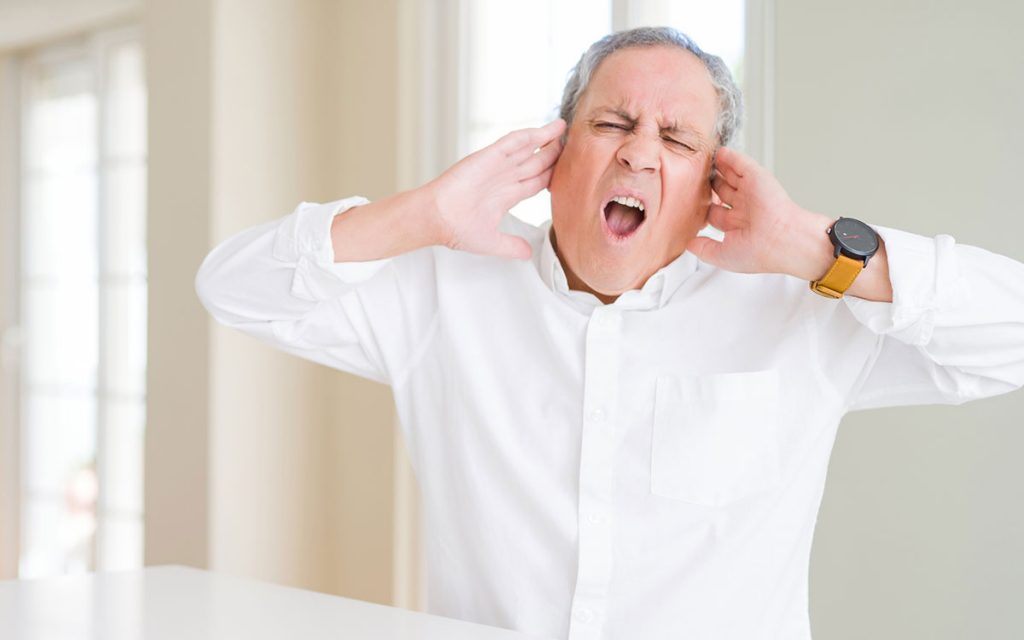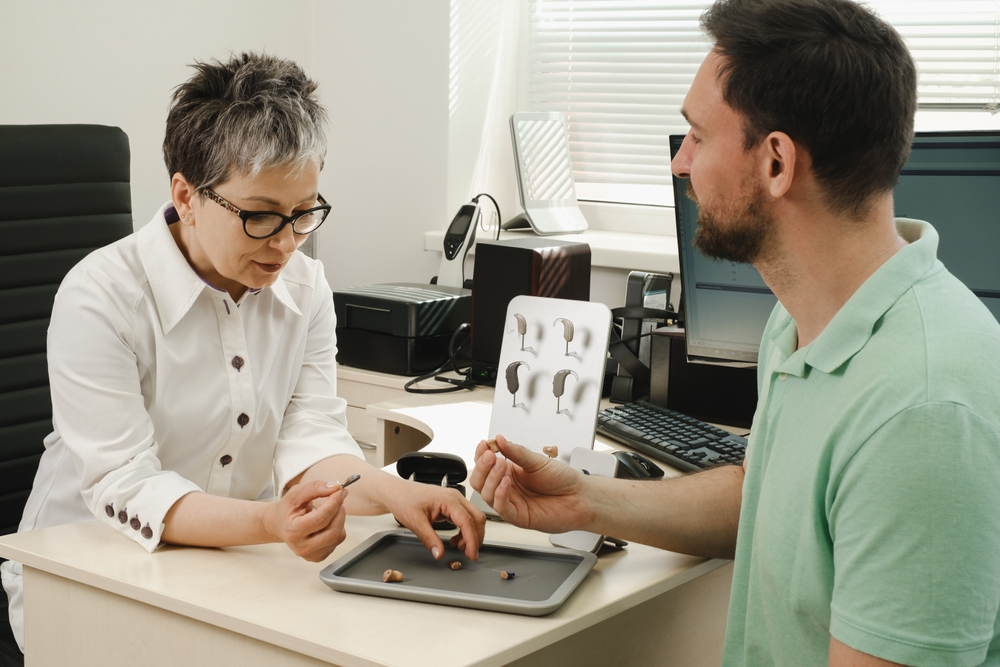You started wearing hearing aids because you want to improve your ability to hear sounds (don’t worry, we’ll thank Captain Obvious later). But sometimes, hearing aids themselves generate buzzing or whistling sounds. This can range from annoying–when it’s quick and low-volume–to downright painful if the noises are loud or sustained.
Assuming you’ve checked the batteries and they’re fine, you’re probably hearing feedback. Yes, just like a grade school principal awkwardly stepping up to the microphone to make an announcement–and making everyone wince as the sound is accidentally re-amplified. Sound is rebounding within your ear and going through your hearing aid twice. Here are four of the most common causes of feedback–and how to fix each one.
Your hearing aid was touched or bumped
If you get a quick hit of feedback, the most likely culprit is contact. Maybe you put your hand or phone to your ear, but you gave someone a hug. (We know, you were trying to be nice!) Hats, scarves, and other headgear can also interfere by placing obstacles in the paths sound waves are traveling to get to your ear. If you’re getting more than a quick blip of feedback, but you’ve also decided to accessorize today, try taking off your hat or scarf to see whether the feedback disappears.
You’ve got the volume too high
Feel like you need to turn your hearing aids all the way up to hear properly? Like a heavy metal band taking the volume to eleven, you’re more likely to hear feedback. If you’re in a situation where you temporarily need to turn up the volume, that’s understandable (though again, you’re increasing the risk of hearing whistling or buzzing). But if you always (or almost always) have your hearing aids turned all the way up, it may be time to schedule a hearing test. You may need to have your hearing rechecked; if your hearing hasn’t changed, a hearing specialist can figure out whether there’s a problem with your hearing aids or if you need new ones.
Your ears are dirty
We know–it always seems to come back to earwax, doesn’t it? But wax that’s built up in your ears can prevent sounds from getting to your hearing aids, and if it’s forcing sound back out–or trapping sound in–you’re going to hear buzzing or whistling sounds. One way to check whether this might be the issue is to take out your hearing aids and see whether they appear especially grimy and/or if wax has gotten into any part of the hearing aids.
Your hearing aids don’t fit
Hearing aids are made to conform to your ears, but when they don’t, sounds can bounce around and cause feedback. A really simple reason you might not have the right fit is that you didn’t properly insert your hearing aids. Especially when you’re new to hearing aids and getting used to wearing them, you may be inclined to make them feel more “comfortable”–but that often means they’re too loose. Take them out and reinsert them, making sure they’re seated snugly inside your ear.
Not a placement problem? There are a couple of other common causes of fit issues. If you’ve experienced significant weight loss or gain, it could impact how your hearing aids fit–though your ears are the same size, changes in skin laxity (for example) can affect hearing aids’ placement. Had your hearing aids a long time? You may be due for replacements, or at least replacement parts. If pieces of your hearing aid shrink, crack, or harden, it can alter the fit and result in feedback.
Occasional feedback–like from a hug or a hat–is inevitable. But if your hearing aids are buzzing or whistling more often than not, make an appointment to get them checked out. After all, your hearing aids are there to help you experience the sounds you want to hear!
3 Ways to stop your hearing aid from whistling
So your hearing aids keep whistling, and it will not stop no matter what you try. The whistling you’re hearing is more commonly known as feedback. It’s like what happens when a person holding a microphone gets too close to the sound system–the only difference is this time it’s directly in your ear.
Fortunately for you, this is a common problem, and there are a handful of ways to address it. We’ve put together a recap of three tried-and-true ways to stop your hearing aid from whistling.
1. Adjust the fit of your hearing aid
Perhaps the most prevalent reason for feedback or whistling in the ear involves the positioning of your hearing aid in your ear or the earmold connected to it. If the hearing aid does not fit properly within your ear, sound can escape and reverberate through the hearing aid’s microphone. The result of that leakage can be a whistling that’s either intermittent or constant, depending on how much sound has escaped and how poorly the fit is. With some hearing aid models, a plastic tube will connect the actual device with the earmold. Over time, this piece can harden, shrink, or crack, which unseats the earmold from its proper position. This movement can cause whistling, but you can correct the issue by replacing the plastic piece.
2. Remove excessive earwax
It’s ironic to think of something like earwax–which is perceived by many people to be foul or unwelcomed–as beneficial to our bodies, but it really does serve a practical purpose. This gooey substance acts as a defense against irritants like dirt and prevents them from entering our ears. While your ears will self-regulate the amount of earwax you hold, through actions like chewing or talking, there are times when a buildup of too much earwax can have negative repercussions. When you insert a hearing aid on top of an extreme amount of earwax, you’re bound to receive feedback. The reason for this is that the amplified sound has nowhere to go due to the blockage from the wax. With no clear exit, the sound circles and passes through the microphone once more. There are a few ways to remove an abundance of wax from your ears through home remedies like letting a warm shower run into your ears. However, the best idea may be to speak to a hearing specialist about properly cleaning your ears to avoid undue buildup and subsequent whistling.
3. Uncover the microphone
Sometimes the most obvious solution is the most effective. How many times have you seen someone try to take a photo with the lens cap on their camera and watched as they became momentarily baffled about why the picture didn’t come out? The same principle applies here. Caps covering the hearing aid can cause them to whistle. You may even get the same result by covering the microphone with your hand or another object–like if you hug someone and bury your ear into their shoulder. Uncovering the hearing aid should suffice in fixing the issue.
Manufactures are routinely integrating new hearing aid technology into devices, and we’ve already seen modern models alleviate some of these causes for concern. If you’re consistently having problems with whistling from your hearing aids, or you’re interested in learning more about new technology among devices, call your hearing specialist. They can check your device and advise you of any new technology.



